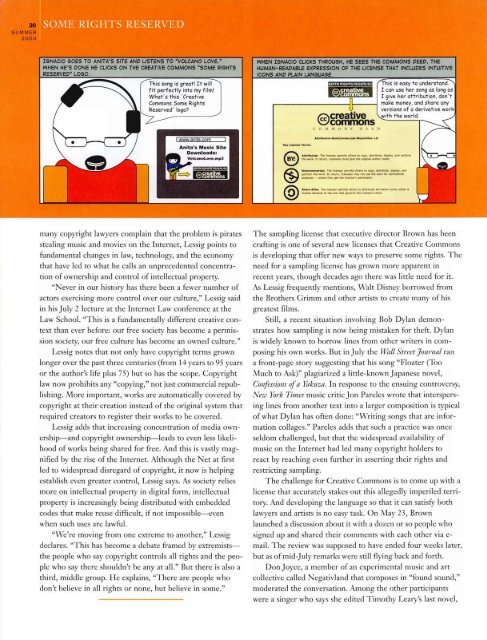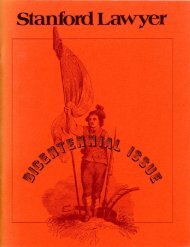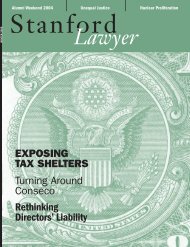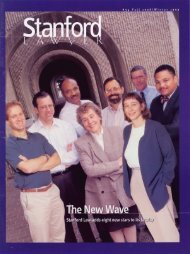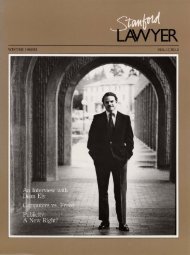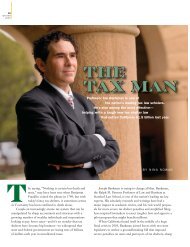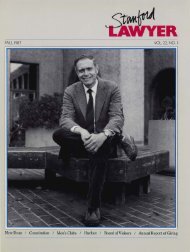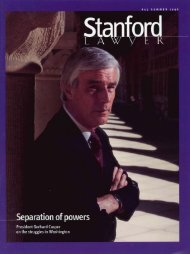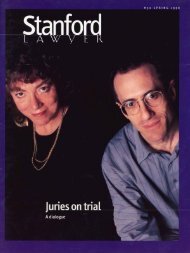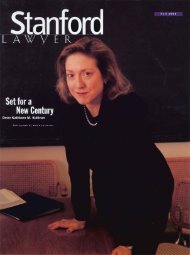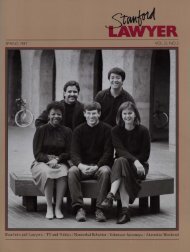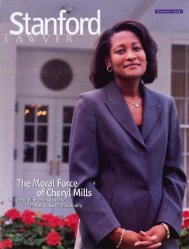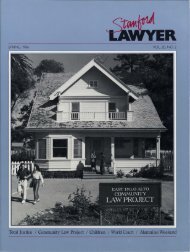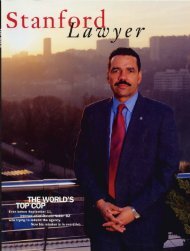Summer 2003 – Issue 66 - Stanford Lawyer - Stanford University
Summer 2003 – Issue 66 - Stanford Lawyer - Stanford University
Summer 2003 – Issue 66 - Stanford Lawyer - Stanford University
- No tags were found...
You also want an ePaper? Increase the reach of your titles
YUMPU automatically turns print PDFs into web optimized ePapers that Google loves.
20SUMMER<strong>2003</strong>• IIGNACIO GOES TO ANITA'S SITE AND USTENS TO ·VOLCANO LOVE.·WHEN HE'S DONE HE CUCKS ON THE CREATIVE COMMONS ·SOME RIGHTSRESERVED· LOGO.This song is great! It willfit perfectly into my film!What's this' CreativeCommons Some RightsReserved' logo?WHEN IGNACIO CUCKS THROUGH, HE SEES THE COMMONS DEED, THEHUMAN-READASU: EXPRESSION OF THE UCENSE THAT INCLUDES INTUITIVEICONS AND PLAIN LANGUAGE.This is easy to understand.I can use her song as long asI give her attribution. don't,..----------i'I------i make money. and share anyversions of a derivative workQcreative with the world.~convnonsCOM"U'!t 1)110I wwwantta,com...tui.....I_-N-eom-.u..·Sh......uiIll..1-0many copyright lawyers complain that the problem is piratesstealing music and movies on the Internet, Lessig points tofundamental changes in law, technology, and the economythat have led to what he calls an unprecedented concentrationof ownership and control of intellectual property."Never in our history has there been a fewer number ofactors exercising more control over our culture," Lessig saidin his July 2 lecture at the Internet Law conference at theLaw School. "This is a fundamentally different creative contextthan ever before: our free society has become a permissionsociety, our free culture has become an owned culture."Lessig notes that not only have copyright terms grownlonger over the past three cenmries (from 14 years to 95 yearsor the author's life plus 75) but so has the scope. Copyrightlaw now prohibits any "copying," not just commercial republishing.More important, works are automatically covered bycopyright at their creation instead of the original system thatrequired creators to register their works to be covered.Lessig adds that increasing concentration of media ownership-andcopyright ownership-leads to even less likelihoodof works being shared for free. And this is vastly magnifiedby the rise of tile Internet. Although the Net at firstled to widespread disregard of copyright, it now is helpingestablish even greater control, Lessig says. As society reliesmore on intellectual property in digital form, intelJecmalproperty is increasingly being distributed with embeddedcodes that make reuse difficult, if not impossible-evenwhen such uses are lawful."We're moving from one extreme to another," Lessigdeclares. "This has become a debate framed by extremiststhepeople who say copyright controls all rights and me peoplewho say there shouldn't be any at all." But mere is also athird, middle group. He explains, "There are people whodon't believe in all rights or none, but believe in some."The sampling license mat executive director Brown has beencrafting is one of several new licenses that Creative Commonsis developing that offer new ways to preserve some rights. Theneed for a sampling license has grown more apparent inrecent years, though decades ago mere was little need for it.As Lessig frequently mentions, Walt Disney borrowed fromthe Bromers Grimm and other artists to create many of hisgreatest films.Still, a recent situation involving Bob Dylan demonstrateshow sampling is now being mistaken for tileft. Dylanis widely known to borrow lines from omer writers in composinghis own works. But in July the 'Wall Street ]Olwnal rana front-page story suggesting that his song "Floater (TooMuch to Ask)" plagiarized a little-known Japanese novel,C011fessio77s ofa Yakuza. In response to the ensuing controversy,Ne7v York Times music critic Jon Pareles wrote that interspersinglines from another text into a larger composition is typicalof what Dylan has often done: "Writing songs that are informationcollages." Pareles adds that such a practice was onceseldom challenged, but that the widespread availability ofmusic on the Internet had led many copyright holders toreact by reaching even further in asserting their rights andrestricting sampling.The challenge for Creative Commons is to come up with alicense that accurately stakes out mis allegedly imperiled territory.And developing me language so tllat it can satisfy bothlawyers and artists is no easy task. On May 23, Brownlaunched a discussion about it with a dozen or so people whosigned up and shared their comments with each omer via email. The review was supposed to have ended four weeks later,but as of mid-July remarks were still flying back and fortll.Don Joyce, a member of an experimental music and artcollective called Negativland that composes in "found sound,"moderated the conversation. Anlong the other participantswere a singer who says she edited Timothy Leary's last novel,


